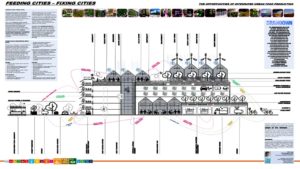ABOUT
Geneva, Switzerland. Chris Jones is a sustainable urbanism consultant with a specific focus on urban synergies and spin-off benefits that can be embedded into the design of urban spaces with circularity and sustainable food systems at the core. Chris helps to develop strategies and designs for creating resilient developments, communities and regeneration assignments for various clients. The projects shown here have been carried out in his capacity as a member of the liveable cities team at KuiperCompagnons.
In the 15 years since graduating in Landscape Architecture from MMU, Chris has enjoyed varied employment that has taken him around the world. Home has been Manchester, London, the Netherlands, Ethiopia and now Switzerland. Work has been in more than 10 countries including India, Indonesia, China, Russia, The Middle East. Diverse experiences continue to shape Chris professionally and personally. From high level strategic planning, through master plan and large-scale developments to detailed interventions, construction projects, events and project management, Chris brings commitment, quality and honesty to the table.
Whilst Chris’ work is rooted in landscape and urban design, a common thread throughout many of the projects is sustainability, circularity and food systems. Using these powerful starting points and a holistic way of thinking, Chris’ work is based on the philosophy that every design or planning intervention should seek to efficiently and creatively result in diverse positive benefits to communities, clients, cities and for the environment.
WHY CIRCULARITY AND URBAN FOOD SYSTEMS?
Moving towards a (largely urban) global population of 9 billion+, we need to be creative in how we responsibly provide quality food for all. Reducing artificial cooling (#1), eliminating food waste (#3) and transitioning to more plant rich diets (#4) are Project Drawdown top solutions. The Ellen MacArthur Foundation has also identified fixing food systems as critical and as a core element in achieving circular economies. The EAT Lancet Commission has also reported on how we can build healthy diets for people and planet.
Linking the points of food production and consumption more closely makes sense in terms of quality and efficiency. Local production means less refrigerated transportation and storage, whilst urban food production can have many more direct and indirect benefits from building (insulation) enhancement and repurposing, to storm water management, microclimate improvements, biodiversity support, education, community building, circular economy and more. Urban farming is plant focused and embraces cross silo innovations more than traditional agriculture.
More: Here’s an initiative Chris is launching early 2020
FEEDING CITIES: FIXING CITIES – a Drawdown Ecochallenge
Feeding Cities: Fixing Cities is a research and concept development project. The aim is to illustrate, through case studies, facts and a study of policies etc. how important, effective and impactful healthy food systems are for our urban areas and for working towards a healthy planet.
This project is about collaboration, discussion, interaction and inspiration. The starting point is the Drawdown Ecochallenge website where you can view my proposed actions, make suggestions, get involved… Please take time to explore this great opportunity and join me in person if you are nearby Geneva, Nyon, Lausanne… or online!
We’ll kick-off in January 2020. See you all then.







